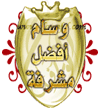عبير عبد القوى الأعلامى
نائب المدير الفني



عدد الرسائل : 9451

بلد الإقامة : مصر
احترام القوانين : 
العمل : 
الحالة : 
نقاط : 17663
ترشيحات : 33
الأوســــــــــمة : 
 |  موضوع: تعريف اللغة الروسية مع دروس والحالات {Russian language less موضوع: تعريف اللغة الروسية مع دروس والحالات {Russian language less  21/8/2011, 13:33 21/8/2011, 13:33 | |
| This Russian language lesson is all about the Russian dative case. This is the fifth Russian case we will learn, there is only one case left after this lesson. This lesson does introduce more grammar concepts and word endings for you to learn. However, this is just the Russian language, you need to be able to use all cases effectively in order to be able to speak Russian. Try your best to remember the different endings to all the cases you have learnt, sometime it helps to learn them by looking at examples. If you can not remember the other cases you have learnt, revise them quickly now using this site’s grammar section.
The Russian dative case is used to represent the indirect object. This is the person or thing that receives the main object. The dative generally corresponds to the English word “to”, although this rule is only general, as the word “to” has many meanings in English.
Firstly we will see how we form the dative case from normal dictionary form nouns. Then we will investigate the many ways in which we are able to use the dative case in Russian. The Russian language relies on the dative case more then you might first expect. Forming the dative caseTo create nouns in the dative case, we first start with the nominative (dictionary) formMasculine Nouns. If the noun ends in a consonant, add “у”.
. Replace “й”, with “ю”.
. Replace “ь”, add “ю
Feminine NounsReplace ]“а” with еReplace “я” with “е”.Replace “ь” with “иReplace “ия” with “ии”.]Neuter NounsReplace“о”withу”
Replace “е” with “ю”
PluralsLook at the last letter nominative singular form (dictionary form) and1. If the noun ends in a consonant, add "ам".
2. Replace "а", "о" or a consonant with "ам".
3. Replace the last letter with "ям"
Here are some examples
Адам - АдамуЕлена - Елене
Молоко - Молоку
Вино - Вину
Pronouns of the Dative Case]It is worth learning the dative case personal pronouns quite well as they are used more than you might expect. Мне - meТебе - you " informal Ему (m), Ему (n), Ей (f) - him, it, her Нам - us Вам - you " formal, or plural. Им - them. Using the Dative Case for Indirect Objects The indirect object is the person or object in a sentence that receives something. For example in the sentence “Ivan gives flowers to Anna”, the word “Anna” is the indirect object. It should be used in the dative case. In this sentence notice that the dative case is used in the place of the word “to” When the above sentence is rearranged to “Ivan gives Anna flowers”, the word “Anna” is still used in the dative case as Anna is the person who is receiving the object. Similarly, in Russian the word order of a sentence can be rearranged. In fact because Russian uses the case system words can be rearranged much more freely than in English. For this reason, you need to be able to recognise cases effectively]The word Давать(give) is commonly used with the dative case. Here are the conjuctions: [/size]Даю - (I) give Даёшь - (you) giveДаёт - (he) givesДаём - (we) give Даёте - (you) giveДают - (they) giveThe command forms of this word include ]Дай - giveДайте - giveمنقوووووووووووووووول |
|
أم البنات
مشرفة



عدد الرسائل : 9513

احترام القوانين : 
العمل : 
الحالة : 
نقاط : 19469
ترشيحات : 44
الأوســــــــــمة : 
 |  موضوع: رد: تعريف اللغة الروسية مع دروس والحالات {Russian language less موضوع: رد: تعريف اللغة الروسية مع دروس والحالات {Russian language less  1/6/2014, 10:27 1/6/2014, 10:27 | |
| |
|

















